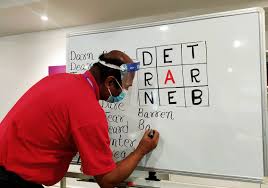
Word games have long been a favorite pastime for many, from crossword puzzles to dynamic options like Wordle and Scrabble. These games, while entertaining, offer a multitude of surprising benefits that can enhance cognitive function, improve mental health, and boost social skills. Let’s delve into how engaging with word puzzles and games can positively impact both the mind and emotions, particularly in terms of memory, focus, and overall mental wellness.
Enhancing Cognitive Function and Memory
One of the most compelling reasons to engage with word games is their impact on cognitive health. Whether you’re playing a solitary crossword or a lively game of Boggle with friends, these games challenge the brain in ways that can stimulate and strengthen various cognitive functions.
Boosting Memory and Attention
Research has consistently shown that solving word puzzles helps improve memory and attention span. This is largely due to the mental effort required to recall words, track multiple solutions, and retain information in the process. For example, when playing a game like Scrabble, you must not only focus on forming valid words but also remember previously used words and the letters available to you. This practice improves short-term and working memory, which are crucial for daily mental tasks.
Promoting Neuroplasticity
Word games also contribute to neuroplasticity—the brain’s ability to reorganize itself by forming new neural connections. The frequent challenge of solving word puzzles strengthens the connections between different parts of the brain, aiding in faster information processing and improving brain health over time. By regularly exercising your mind with these games, you help maintain and even enhance cognitive function, which could delay age-related mental decline.
Improving Vocabulary and Spelling Proficiency
An immediate benefit of engaging in word games is the significant improvement in vocabulary and spelling. Each game, from classic Scrabble to modern options like Wordle, exposes players to a variety of words, some of which may be unfamiliar.
Building a Richer Vocabulary
When playing word games, players often encounter new words that are both stimulating and educational. By challenging oneself to form words in different contexts or solve word puzzles, individuals naturally expand their lexicon, increasing their command of the English language. As a result, word game enthusiasts are often better equipped to communicate clearly, whether in professional settings, casual conversations, or creative writing.
Reducing Spelling Errors
Regular practice with word games also sharpens spelling skills. Many word games require players to spell words correctly in order to win points or complete puzzles. This consistent exposure to spelling challenges trains players to recognize common patterns in word construction and spelling, ultimately reducing errors in daily writing.
Stress Reduction and Mental Clarity
In today’s fast-paced world, stress and anxiety are pervasive. Fortunately, word games provide a simple yet effective escape from these pressures, offering both relaxation and mental clarity.
Mindfulness and Focus
Word games engage the brain in a state of mindfulness, where players must focus their attention on the task at hand. This concentration on the present moment serves as a welcome distraction from stressors. Whether you’re absorbed in a challenging puzzle or strategizing in a game of Bananagrams, the act of solving word-related problems can provide a meditative effect, helping to lower cortisol levels and alleviate anxiety.
Mental Rest and Rejuvenation
Taking a break from daily worries by engaging in word games allows the mind to rest and rejuvenate. It provides an opportunity to unwind without the need for extensive effort, allowing players to reset their mental state. After playing a few rounds of a favorite word game, individuals often report feeling more relaxed and better equipped to handle stressful situations.
Enhancing Social Skills Through Interaction
Many word games, such as Scrabble, Bananagrams, and League of the Lexicon, are inherently social in nature, requiring interaction between players. These games promote collaboration, teamwork, and friendly competition, which can significantly improve social skills.
Improving Communication and Collaboration
When playing word games with others, players must communicate effectively to agree on words, share ideas, and even negotiate their strategies. This enhances both verbal and non-verbal communication skills. Additionally, word games require players to collaborate or compete within the bounds of rules, fostering a sense of camaraderie and mutual respect.
Strengthening Relationships
Engaging in shared activities like word games fosters stronger interpersonal bonds. Whether with family, friends, or colleagues, playing together builds a sense of community and teamwork. The experience of playing word games often leads to laughter, shared victories, and healthy challenges, all of which contribute to stronger, more meaningful relationships.
Boosting Self-Esteem and Providing a Sense of Accomplishment
There is something uniquely satisfying about solving a challenging word puzzle or winning a competitive word game. These successes, whether big or small, can have a profound impact on self-esteem and confidence.
A Sense of Achievement
Each time a player successfully completes a word puzzle or finishes a game with a high score, they experience a sense of accomplishment. This feeling is not only rewarding but can also provide a boost to one’s self-confidence. Overcoming a challenging word puzzle, for instance, gives a sense of pride and achievement, reinforcing the belief that mental challenges can be overcome with focus and effort.
Fostering Positive Emotions
The emotional satisfaction of solving puzzles and winning games can uplift one’s mood, making word games an effective tool for combating feelings of inadequacy or low self-esteem. The positive emotions generated through gameplay can also help foster a greater sense of happiness and overall well-being.
Conclusion: The Power of Word Games for Mental Wellness
Incorporating word games into your daily or weekly routine offers a myriad of benefits that go beyond simple entertainment. By improving cognitive functions, reducing stress, enhancing social skills, and boosting self-esteem, word games contribute to overall mental health and wellness. Whether you enjoy solitary games or prefer a more social experience, there’s no doubt that word games can serve as an excellent tool for strengthening both mind and spirit.